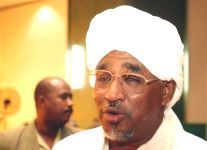Sudanese government, rebels restart talks on Darfur
ABUJA, Nigeria, Oct 25, 2004 (AP) — Sudan’s government and rebels resumed peace talks in Nigeria’s capital Monday aimed at resolving the crisis in Sudan ‘s Darfur region, which has left tens of thousands of people dead and displaced more than 1 million from their homes.

|
|
Majzoub el Khalifa Sudanese agriculture minister and head of Sudanese delegation to the peace talks speaks to journalist in Abuja Nigeria, Thursday Oct. 21, 2004(AP). |
Representatives at the talks said Monday’s meeting would aim at agreeing an agenda for the negotiations, after a previous round of Nigeria-hosted talks broke up a month ago without an agreement.
The new round was meant to begin Thursday, when some participants gathered for a brief opening session in Abuja. But the meeting was delayed after dozens of delegates failed to obtain flights to Nigeria.
The previous round of talks lasted nearly a month, but ended in deadlock because the Sudanese government and the two rebel groups – the Sudan Liberation Army and its smaller counterpart, the Justice and Equality Movement – failed to agree on key security issues.
Sudan Liberation Army spokesman Mahgoub Hussain said his group was still insisting on a wide security agreement, before signing an already drafted humanitarian accord, which would give humanitarian organizations wider access to hundreds of thousands of Darfur refugees.
“I’m looking for security for the people in Darfur,” he said. A humanitarian accord would mean “nothing without a security protocol,” he added.
“Although I should have reasons for being optimistic, I am not,” said Abulrahman Zuma, Press Adviser to the Sudanese government and a delegate at the talks.
He said that Sudan ‘s government was willing to discuss security issues before signing the humanitarian accord, but added that “The problem is the other side – they are not united under responsible leadership.”
The crisis in Darfur began in February 2003, when rebels rose up against Sudan ‘s Arab-dominated government, claiming discrimination in the distribution of scarce resources in the large, arid region. For years before that, African farmers and Arab herders had clashed over the region’s scarce resources.
Major bloodshed ensued when pro-government militias called Janjaweed reacted by unleashing attacks on Darfur villages.
The conflict has displaced 1.5 million from their homes. The U.N. says 70,000 people have died since March, mostly because of poor conditions in camps for the displaced in Darfur. The Sudanese government put the figure at 7,000 dead.
Last week, the African Union’s Peace and Security Council agreed to increase its peacekeeping force in Darfur from 390 to 3,320 troops and civilian police in an effort to end the violence.
Said Djinnit, a senior African Union official said the enhanced force should be in the region by early next month. Zuma of the Sudanese delegation said the Sudanese were “quite ready” to accept the extra peacekeepers.
